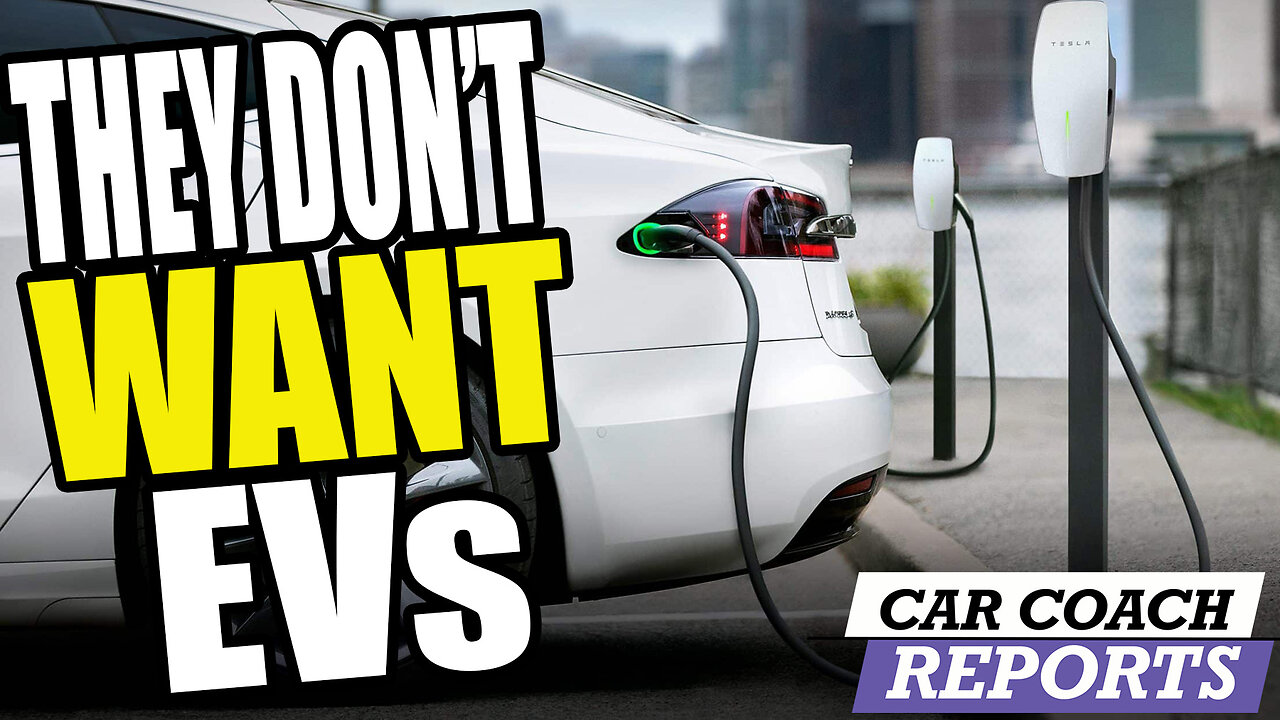Premium Only Content

Why Automakers are Backtracking on Their Ambitious EV Plans - Big Mistake?
Link:
Why Automakers are Backtracking on Their Ambitious EV Plans - Is This a Big Mistake?
By Lauren Fix
Here’s why automakers are backtracking on their electric car game plans. Is backtracking a mistake and allowing China to take the lead forever? And how doe this affect the car buyer?
You may be surprised that this changing landscape or backtrack is occurring; were Americans ever really sold on EVs in the first place? Well, the relatively high cost of EVs, range anxiety, and American consumer preference for hybrids are a few factors to blame.
Americans were never prepared to embrace electric vehicles at the rate predicted by many industry and government “experts”. There was a lot of high-profile noise being made by everyone from Elon Musk to environmental groups, at they quoted EV sales volumes. But when you looked at the change in market share it was clear the process of going all in, or even mostly, EVs are going to take decades, not years.
My strong sense of this was validated by the iSeeCars study last year, which showed individuals markets, meaning cities or states, with more than 7 percent new EV market share growing much slower than markets below that threshold. It was obvious getting from 3 to 7 percent EV share was much easier than getting from 7 to 10 percent. Customers were interested in trying the new vehicles. The media was pushing as hard was the government. And getting EV share to 20, 30, or more percent? That was clearly a long ways off.
Could the move from car manufacturers backfire and hurt brands like Fords and GMs of the world, would they fall behind in innovation and cede this ground to Chinese EV makers?
The Chinese already have every advantage when it comes to EVs. From controlling the global lithium supply to aligning their government and manufacturing sectors to reduce production costs. The best move for U.S. automakers is to sell Americans what they want right now, gasoline and hybrid models, while developing their own EV supply chains within the U.S. This will allow US car makes like Ford and GM to maintain sales and profit while funding a more measured, and realistic, approach to electric vehicles. If domestic automakers, and even European and Asian brands selling in the U.S., think a rushed approach to EVs will put them on even ground with the Chinese they’re going to waste a lot of money learning the hard way. Looking at the financials for most automakers' electric vehicle divisions, and how many electric vehicles are stacking up at their dealer lots, shows they’ve already made this mistake. The only question now is how quickly can they adjust production to reflect true consumer demand.
While other auto makers are back tracking China isn't even fully betting on EVs. They are snatching up internal combustion engine technology that the left leaning European brand have foolishly discarded.
Yes, China is hedging its bets. Like all smart countries and companies do. Meanwhile, we have the current administration and the supporters of the Green New Deal trying to force a single solution on American citizens.
Geely, a Chinese car company, is building around 15 internal combustion engine plants in Europe they will supply Mercedes, Nissan, Renault, Volvo and others. No one forced the Europeans to abandon this technology, but they lose is China’s gain.
Geely will be supplying an ultra efficient 4-cylinder turbo engine. European car executives thought customers would go fully electric. As we know, customers are not as interested as they expected. After all the brands had planned to transition away from gas and diesel powered vehicles.
Some brands saw the writing on the wall and predicted correctly. BMW never committed to the going all electric nor did Hyundai, KIA and Genesis. They continued to offer multiple choices. Toyota was the most resistant to the transition and this will prove to be a very smart business move.
The other Germans car companies, GM and Ford went fully in on electric cars and had future plans to be all electric. Now they are backtracking, this is going to cost them financially in the big picture. Few companies will benefit from as the rest of the industry's short sightedness has impacted their bottom line.
China continues to take more car market share as others had it so wrong. Starting in late 2022, China took over nearly 100% of the Russian car market in a matter of months. Nearly 100% of those cars in turn are ICE (gas) cars, they are not electric or even hybrid. This has been the source of China's biggest export boom in its history, measured less than two full years. They have shot itself in the foot, losing all that income.
The question remains: Will companies like Ford, GM, Stellantis, and others who have pulled back investments eventually lose EV market share — and will companies who have kept innovating and spending emerge as the big winners in the eventual EV transformation? We shall see what happens next.
You can support me by buying me a cup of coffee. Thanks for subscribing and your support! https://www.buymeacoffee.com/laurenfix
We will be reviewing all of the newest cars on our YouTube channel https://www.youtube.com/@car-smarts
Looking for more automotive news? https://youtube.com/@car-smarts
Additional articles on our website https://www.CarCoachReports.com
"LAUREN FIX'S GUIDE TO LOVING YOUR CAR” Book - https://amzn.to/3ifDi3j
Total Car Score Podcast ► Hosts: Lauren Fix, Karl Brauer and Javier Mota. https://www.revolverpodcasts.com/shows/total-car-score/
-
 7:58
7:58
Car Coach Reports
9 days ago $0.23 earnedWill this Chip Shortage Cripple the Auto Industry AGAIN?
471 -
 24:23
24:23
World2Briggs
17 hours agoTop 10 Towns You Can Retire on $1900 a month in the Pacific North West.
1313 -
 21:23
21:23
Lady Decade
14 hours ago $0.03 earnedThe Lost Sega Neptune Console Refuses To Die !
55 -
 17:14
17:14
ThinkStory
20 hours agoIT: WELCOME TO DERRY Episode 2 Breakdown, Theories, & Details You Missed!
79 -
 17:25
17:25
Real Estate
1 month agoThe Job Market Collapse IS HERE
1434 -
 LIVE
LIVE
BEK TV
22 hours agoTrent Loos in the Morning - 11/05/2025
193 watching -
 LIVE
LIVE
The Bubba Army
21 hours agoUPS PLANE EXPLODES - What Went Wrong? - Bubba the Love Sponge® Show | 11/05/25
2,505 watching -
 16:38
16:38
James Klüg
19 hours agoFOOD STAMPS RAN OUT, Will People Loot?
13.8K29 -
 23:56
23:56
Producer Michael
17 hours agoBuying My Wife a $500,000 Diamond Necklace!
3.97K10 -
 22:31
22:31
Jasmin Laine
15 hours agoLara Trump SILENCES Liberal Canada—Bank ADMITS We Have NO Other Options
5.02K15